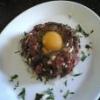Good question. Disclaimer -- I'm not Chinese but have spent a good deal of time there. And I'm not a chef so I'm not an expert. My baseline is based on what I eat in China vs what is available in Chinese restaurants here. In lieu of an explicit definition, I'll offer some examples. Perhaps the professional chef on this forum can offer more exacting definitions.
There are probably many different possible responses, all of which are all correct yet all wrong. One way to answer the question is in the dish itself. It can be something subtle like rice. There are different types of rice. Chinese rice is different from Japanese rice. If you go to a Japanese restaurant, you expect Japanese style rice. Is Chinese rice bad? Not necessarily. But it's not what a Japanese would expect in a Japanese restaurant. To further expand on this example: it's one thing to know the difference but not have access to the ingredient. It's entirely different to have access to the ingredient but not know the difference.
It can be something like ingredients. For example, amaebi here in the US is generally not the same amaebi shrimp used in Japan. Perhaps reasonably so given that it's probably difficult to source here. But in my mind, it shouldn't be called amaebi as expectations are different.
More generally, it may be the availability of dishes that are more traditionally Chinese or Japanese (or any country) but are not served here as dishes are catered and adjusted to local palates. For example, while Sweet&Sour Pork may be available in China, outside of Westernized hotels, I've never actually seen Sweet&Sour Pork on the menu in a restaurant. I'm actually not sure if this is Chinese food - I'm open to be educated here.
More specifically, it's probably the specific proportions of the right ingredients to achieve a specific taste with 'culturally' expected norms.
I could be given the exact same ingredients but my dish may come out drastically different than someone capable of preparing the same dish in a more authentic manner (again, the taste is w/in boundaries of a 'culturally' expected norm by someone familiar with the dish) -- I may not use the right cooking techniques, or cook things in the wrong order or use the wrong ratios of ingredients (spices, herbs, etc). But it may also come out tasting good -- not as expected, but good. Hence the differentiation between good tasting and authentic. Perhaps in these cases, authenticity is a gray line where I'm not sufficiently knowledgeable to articulate. I'm not a chef. My general rule of thumb (for Chinese food) -- if a dish is not prepared using ingredients typical of those used in China and with a taste within expected boundaries that allow for chef's preferences and style (per my experience based on living in Taiwan for multiple years), it's not authentic. Has nothing necessarily to do with how good or bad it tastes (could be prepared in an authentic manner but taste horrible). The second general rule of thumb is a restaurant that predominately serves dishes that aren't really served in China. I've spent a LOT of time in China and I've never seen General Chicken, Orange Chicken or Sesame Chicken on the menu.
Here's a link to a popular restaurant in Taiwan with a global presence. Admittedly, it's a more relatively focused menu but look ma, no Sweet and Sour.
http://www.dintaifun....com/index.html
Addendum: while researching Sweet and Sour Pork (it appears it is a Cantonese dish, which really surprised me; if it were Chinese, Cantonese style is the last I would have guessed), I came across this in Wiki.
http://en.wikipedia....Chinese_cuisine
If you're up for it, perhaps someday we can take a trip to the South Bay for some 'authentic' Chinese food. I promise -- it's not scary stuff and the places are clean. I'm all for the Green Sticker campaign we have in Sactown. But perhaps there will be dishes you've never tried before.
I dunno. You raise a good question. The only way I can really answer it is: "Just I know."
Excellent detailed reply - thank you for that, I really enjoyed reading it. I'd be up for taking a trip with you to the south bay for that authentic Chinese food and don't worry about scary stuff - I've had what I consider the most scariest foods ever when I was in Chengdu, and since then nothing has ever shocked me again.... but I'm always willing to try - I like to consider my food adventures to be like a cross between Anthony Bourdain and Andrew Zimmerman, I'll try anything at least once.
BTW, about the rice, I learned all about Japanese sticky rice and how to prepare it - it sure isn't as easy as boiling water and adding rice as one would think and it is completely different from all other rices, its actually amazing to me the way it tastes and the texture it takes on. My personal favorite rice is Basmati which is nothing at all like Chinese or Japanese. (ain't it great having so many choices)
and heck, even within the Chinese foods there is complete differences between Cantonese and Mandarin
Seriously, I would really like to go with you to check out that food in the South Bay with you sometime - let me know when.
















